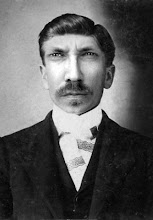
Discussing his preparation for the role of Mark David Chapman in the film Chapter 27, Jared Leto talks almost exclusively about the weight he gained, and the toll this took on him physically. Chapman, you'll recall, murdered John Lennon outside the Dakota Building in December of 1980. He wasn't a small guy, or even apparently in any condition approaching "fit"; nor does he seem, in the pictures I've seen, strikingly obese. In the making-of featurette which accompanies the Chapter 27 DVD, Leto says that the weight gain affected him completely; the way he moved, the way he thought and felt. It was horrible. He'd stretched out his stomach to such an extent, he said, that if ever he bent over during the shoot, bile would start to flow back up his throat. His feet ached unbearably on the walk from his trailer to the set. He took to using a wheelchair. It's something you couldn't pay him to do again, and yet the role, he understands, required it of him, as if it were something of a calling.
Just how ridiculous this is becomes apparent when you consult the film again and see that Leto, as Chapman, looks no more hideous than half the people you know, none of whom you consider horribly out of shape, some of whom you might even find slightly or more than a little attractive. To hear Leto talk, you would think the actor gained hundreds of pounds to portray his subject faithfully. Reportedly, he gained 67 pounds for the role, by drinking microwaved pints of ice cream mixed with soy sauce and olive oil every night. His body doesn't seem to have lost its muscle tone altogether; in various scenes depicting Chapman in his hotel room, the actor wanders around in underwear, the lamplight moving over a still fairly structured physique. You can see Leto's mind working feverishly in these shots, trying to run through his rolodex of fatso behavioral attitudes. He puffs out his cheeks, retracts his chin, allows his body to double over, creating vaguely pendulous silhouettes. It's as if Leto is noticing his body for the first time, as though the role gave him an excuse to enjoy his physicality as something corporeal and sensuous, rather than a vessel whose sole purpose is to make money and maintain a competitive edge through various systems of deprivation and abstinence.
According to Jared, being that heavy was depressing, and because he couldn't think of anything else, he apparently can't believe that Chapman would have been able to either. Ergo, Chapman killed Lennon because he was unhappy, which is to say because he was wretchedly fat. The director subscribes to this kind of reductionism as well, promoting the idea that Chapman had very little on his mind beyond "kill" and Catcher in the Rye, from which the movie quotes shamelessly and copiously. While Chapman might have inscribed a copy of Salinger's novel with his signature and a paragraph indicating his conviction that the book would explain his behavior, he has also acknowledged that he was directed and judged by a committee of imaginary "little people", and that he was equally fascinated with Dorothy from The Wizard of Oz. No such complexity here. The voice-over narration of Chapter 27 presents a rambling, wimpy caricature, closer in spirit to the feeble but grumpy public persona of Bette Davis succumbing to late stage Alzheimers than a man who, however mentally unbalanced, managed to travel around the country on money he talked his wife into borrowing from her mother.
Chapter 27 is interested only in Salinger and Catcher. Everything in the narrative must be explained by this connection, reducing Chapman to a simplistic notion of obsessional insanity. It chooses to focus on Chapman's last three days in Manhattan, but not how he funded his stay, or the circumstances of his life in Hawaii, including lost jobs, a short fuse, an extra-marital affair which consumed him with guilt, and a desire to kill himself which brought him there in the first place. Many conspiracy theories have evolved concerning his murder of Lennon, the most persistent of which asserts that he was a mind-controlled assassin, trained by the FBI and the CIA. Such is the movie's particular accomplishment that even after driving home its singular theory for an hour an a half, it succeeds in failing to make Catcher in the Rye feel very compelling or even believable as the engine of a mental disorder, and renders the idea that Chapman would have killed anyone in anything but a momentary pique of irritability highly implausible. The mind-control conspiracy makes much more sense.
Leto isn't horrible, and I wonder what he might have done with more intelligent direction, or writing. The most poignant thing about Chapter 27 is the sense it gives you that this, the first opportunity for its lead actor to dig into a character with any depth who doesn't happen to be peripheral or supporting, might also be his last.




2 comments:
"Leto wasn't horrible..."
Do you mean as an actor or as a person?
It was frankly the most irritatingly stupid vocal characterization not being done by Nicholas Cage that I've ever heard.
I mean as a lard-ass.
Post a Comment